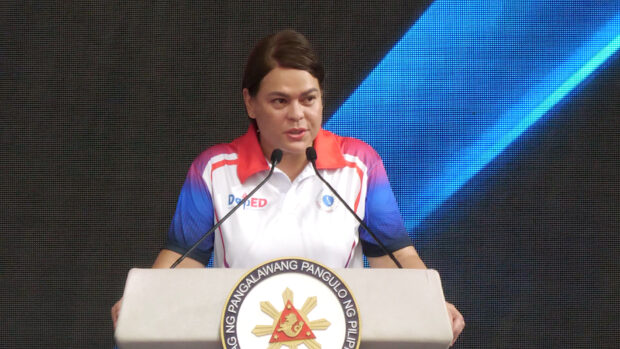
Vice President Sara Duterte, who is also the DepEd secretary, at the opening ceremony of the Palarong Pambansa on July 31, 2023. (File photo by RYAN LEAGOGO / INQUIRER.net)
MANILA, Philippines — Since its launching in November last year, the Department of Education’s (DepEd) Telesafe Contact Center Helpline has received 213 reports of abuse of children.
At a program in Manila on Monday marking the culmination of National Children’s Month, Vice Presiden Sara Duterte, who is DepEd secretary, reported that verbal abuse was the most common form of violence experienced by students in schools, followed by sexual abuse and physical bullying.
Duterte later told reporters in an ambush interview that some complaints led to the filing of administrative charges against teaching and nonteaching personnel.
In cases that warranted the filing of criminal charges, help was sought from the police while in “simple cases” of misunderstanding, priority was given to reconciling the parties involved, she said.
“We start with dispute resolution. We don’t immediately punish, [instead] we resolve the conflict inside the school,” she said. The helpline, part of DepEd’s Learner Rights and Protection Office (LRPO), was established to offer immediate assistance, intervention and referral in relation to any reported incident of abuse against students.
‘Global epicenter’
In a document sent to the Inquirer, the LRPO gave a breakdown of a total 1,709 complaints it received from November 2022 until Nov. 27 this year.
The majority of the reports, the LRPO said, were complaints about being unable to enroll or issues regarding the collection of funds in some schools. But there were 77 reports of verbal abuse, followed by 70 about sexual abuse and 66 about physical bullying, for a total of 213 cases involving violence.
In her speech during the program, Duterte lamented that despite efforts and interventions to ensure the protection of children, many continue to live in conditions of violence and poverty with inadequate access to education, health care, shelter and other basic services.
Citing the report of the United Nations International Children’s Emergency Fund, she said the Philippines “has become the global epicenter of the live-stream sexual abuse trade, and many of the victims are children.”
“The magnitude of this problem is doubly unsettling because our children have access to the internet, where information exchange is fast and even real-time,” she said, adding that apart from sexual abuse, children were also subjected to online bullying, hate speech, and other forms of violence.
The LRPO said it would implement policy interventions, emphasizing its advocacy to protect and uphold the rights of students.
READ: Gender-based violence: A disease more pervasive than COVID
Safe spaces policy
Among its initiatives would be the enhancement of DepEd Order No. 40, s. 2012, or the “DepEd Child Protection Policy,” which would now include recently enacted laws and other issuances in line with protecting both teachers and students.
Suzette Gannaban Medina, LRPO officer in charge, said that with technology evolving at a rapidly increasing pace, the enhanced policy would seek to address emerging issues like online sexual abuse and exploitation of children, “grooming,” unclear protocols in handling cases, nonfunctional child protection centers in schools, and concerns about amicable settlement of cases and corporal punishment.
“The enhanced policy now includes the prohibition of online sexual abuse or exploitation of children, proliferation of child sexual abuse or exploitation materials and grooming,” Medina explained.
DepEd would also issue guidelines on implementing the Safe Spaces Act or Republic Act No. 11313 in basic education institutions.
“The policy aims to address gender-based sexual harassment in schools, ensuring a safe and positive learning environment free from gender-based violence, especially gender-based sexual harassment that may be committed [against] learners, educators, and personnel,” Duterte said in her speech.
According to Medina, gender-based violence includes catcalling; cyberstalking; gender-based online and sexual harassment; homophobic, misogynistic, sexist and transphobic remarks or slurs; and wolf whistling.
Under the new safe spaces policy in basic education institutions, Medina said they would create a code of conduct to address gender-based sexual harassment and establish a committee on decorum and investigation.
“The DepEd recognized that the incidence of gender-based sexual harassment may happen in schools. To address these, we formulated guidelines to strengthen its zero-tolerance policy for gender-based sexual harassment,” she added.
Abuse victims would be provided with immediate and appropriate interventions, mental health and psychosocial support services, and referred to agencies offering help like clinics and hospitals. They can contact the LRPO by emailing weprotectlearners@deped.gov.ph, calling 02-86321372, or texting 09451759777.
READ: CHR to govt: Uphold local, int’l tack in addressing gender-based violence
Children in armed conflict
Lastly, Duterte said DepEd would also issue protocols for handling children in situations of armed conflict (CSAC), as she noted the “alarming incidence” of such cases that directly affect schools and students.
The guidelines are intended to address issues on inadequate programs and services catering to returning learners from armed conflict as well as their reintegration, facilitating family tracing and establishing a clearer reporting mechanism.
DepEd has identified three categories of CSAC, including children involved in armed conflict or those who participated directly or indirectly in armed hostilities as combatants or fighters; those affected by or who experienced armed conflict but did not participate; and internally displaced children, or those who are forced or obliged to flee or leave their homes to avoid the impact of violence and armed conflict.

